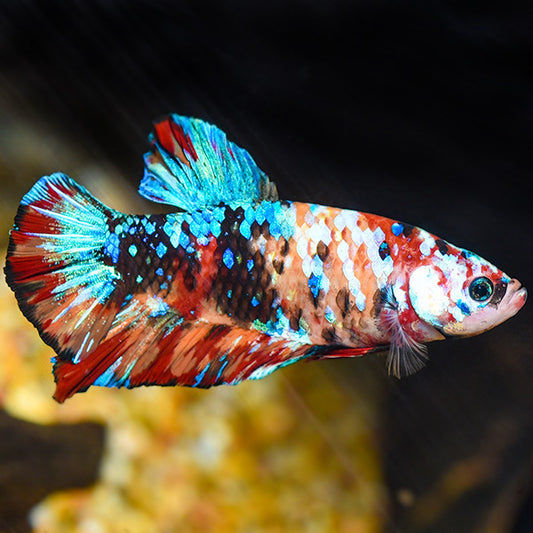The Ultimate Overview to Betta Fish Care: Vital Tips for Maintaining a Healthy and Successful Fish Tank Atmosphere
Efficient Betta fish treatment necessitates a thorough understanding of their one-of-a-kind ecological and physical needs. Establishing a suitable aquarium starts with picking the right container size and guaranteeing ideal water conditions, which are vital for the health and well-being of your Betta.
Selecting the Right Storage Tank
Picking the proper storage tank for your Betta fish is critical to ensuring its health and wellness. Bettas thrive in settings that resemble their natural habitats, which usually include tranquility, cozy waters. A storage tank size of at the very least five gallons is recommended to give ample swimming space, as smaller sized storage tanks can result in anxiety and health and wellness concerns for these dynamic fish.
When choosing a storage tank, consider the container's form and purification system. A rectangular tank is preferable to a dish, as it uses a lot more surface for oxygen exchange. In addition, a reliable purification system is necessary to preserve water high quality and lessen the regularity of water changes (betta fish). It's essential to pick a filter with a mild flow, as Bettas are not strong swimmers and might struggle versus solid currents.
Temperature regulation is another key element; Bettas prefer water temperatures in between 76 ° F and 82 ° F. Spending in a great heating system will certainly make certain that the water remains within this range, advertising a healthy and energetic way of life for your Betta. Lastly, providing proper tank designs and hiding places will certainly help in reducing stress and urge all-natural habits, further enhancing your Betta's wellness.
Preserving Water Top Quality
Preserving optimum water quality is necessary for the wellness and long life of Betta fish. This requires regular monitoring of numerous specifications, consisting of temperature, pH, ammonia, nitrite, and nitrate degrees. Bettas flourish in temperatures in between 76 ° F and 82 ° F, so keeping a steady temperature level is important. Unexpected changes can result in anxiety and health problem.
The pH degree need to ideally fall in between 6.5 and 7.5. Routine screening using a trusted water testing set can help guarantee these specifications continue to be within the appropriate ranges. Ammonia and nitrite levels need to always go to 0 ppm, as even low focus can be harmful to Betta fish. Nitrate levels need to be kept under 20 ppm to stop lasting health and wellness concerns.
Regular water modifications are crucial to keeping water top quality. It is advised to change 25-50% of the storage tank water weekly, depending on the storage tank size and equipping levels. Utilizing a top quality water conditioner can aid get rid of damaging chemicals from faucet water, making sure a safe environment. In addition, integrating a durable filtering system can help in preserving water clarity and quality, providing a much healthier habitat for your Betta fish.
Perfect Feeding Practices
Giving a well balanced diet is vital for the health and wellness and dynamic coloration of Betta fish, as their dietary demands play a considerable role in their overall well-being. Betta fish are carnivorous naturally, calling for a diet regimen high in healthy protein. A mix of high-grade pellets, frozen or real-time foods such as bloodworms, brine shrimp, and daphnia can supply the important nutrients they need.
Feed your Betta fish two to three times a day, using just what they can consume within a couple of mins to stop overfeeding and maintain water high quality. Overfeeding can result in excessive weight and wellness problems, consisting of swim bladder illness. It is vital to monitor their nutritional intake and adjust section dimensions appropriately.
In enhancement to healthy protein, a view it now balanced diet ought to include minerals and vitamins to promote ideal wellness. Take into consideration supplementing their diet plan with high-grade flakes or pellets particularly formulated for Betta fish, as these often include needed additives.

Producing a Suitable Habitat

Water high quality is vital; preserve a temperature level in between 76 ° F and 82 ° F, and guarantee the pH level ranges from 6 - betta fish.5 to 7.5. Normal water changes of 25-50% per week will help maintain toxic substances at bay and ensure a steady setting
Including plants and hiding spots is critical, as Betta fish are normally territorial and appreciate having areas to discover and pull away. Live or silk plants, along with caverns and accessories, can develop a revitalizing environment.

Routine Health Checkups
Performing routine health appointments go right here is important for guaranteeing the well-being of Betta fish, as very early discovery of potential concerns can prevent severe health issue. These checkups should incorporate a detailed assessment of the fish's physical problem, actions, and ecological factors.
Begin by observing the Betta fish for any type of signs of distress, such as sleepiness, loss of appetite, or uncommon swimming patterns. Furthermore, check the fins and body for signs of staining, lesions, or fin rot, which can show infections or parasites. look at these guys On a regular basis checking the water quality in the fish tank is similarly important; criteria such as pH, ammonia, nitrite, and nitrate degrees ought to be maintained within optimum varieties to avoid anxiety and health problem.
Moreover, think about preserving a log of health and wellness observations and water high quality examinations. This document can promote the recognition of trends or recurring issues. If any type of irregularities are spotted throughout the checkup, it is vital to seek advice from a veterinarian experienced in marine pets. Prompt treatment can make a considerable difference in the healing of your Betta fish, making sure a lengthy and healthy and balanced life in a properly maintained aquarium setting.
Conclusion
To conclude, successful Betta fish care hinges on developing and preserving an ideal fish tank atmosphere. Trick elements include selecting a suitably sized tank, making sure consistent water quality, sticking to suitable feeding methods, and creating an environment that decreases stress. Routine wellness check-ups are essential for very early discovery of prospective problems. By following these guidelines, aquarists can advertise the well-being and vibrancy of Betta fish, inevitably resulting in a flourishing aquatic ecosystem.
Comments on “Betta Fish Diet Plan: What to Feed Your Betta for Ideal Health And Wellness”